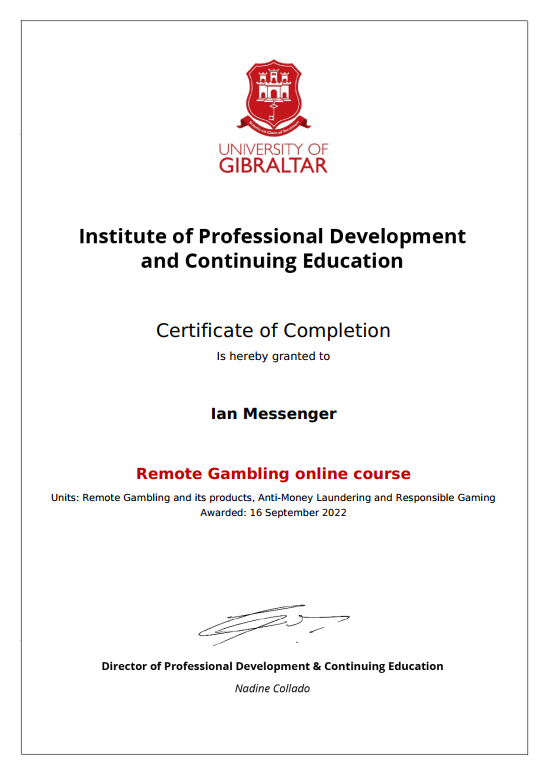Review - Remote Gambling, University of Gibraltar
Ian Messenger
If you are interested in other Casino and Gaming certifications, check out my review of the Certified Gaming Compliance Specialist (CGCS) certification from the Association of Certified Gaming Compliance Specialists.
I recently discovered the Remote Gambling course offered by the University of Gibraltar. This was the first course I have seen which is focused on Remote / iGaming.
Remote Gambling has many names such as Remote/ Internet/ Online/ Mobile gambling/ gaming, iGaming, and eGaming.
The course is offered by the Institute of Professional Development and Continuing Education and takes around 4-5 hours to complete. Consisting of 3 units, the course is assessment via a multiple choice quiz at the end of each unit. There are 3 quizzes in total with a passing grade of 70% in each.
The course is comprised of 3 units:
Unit One : Remote Gambling and its Products
Intro to Remote Gambling
Legal Framework, Licensing and Regulation
Licensed Companies & People
Unit Two: Anti-Money Laundering (AML)
Interpret the Anti-Money Laundering (AML) requirements for the Remote Gambling industry
Understand the key elements of a compliance framework for Remote Gambling Operators. This includes:
Customer Due Diligence over the life of the customer relationship;
The importance of a Suspicious Activity Report (SAR), and when to contribute to one;
The role of record keeping in supporting investigation and prosecution;
Identify different types of financial crime and ML offences, penalties, and consequences for Remote Gambling Operators
Apply this knowledge to scenarios, identify the elements of compliance that can prevent or detect Money Laundering (ML)
Understand the overlap between AML risk and responsible gambling risk
Unit Three: Responsible Gambling
Describe the Regulatory Compliance to prevent underage play
Explain the differences between:
Problem Gambling;
Problem Gambling Comorbidity;
Gambling Harm;
Identify signs of risk for vulnerable players
Understand the process for escalating Player Protection as Player Risk increases
Some key takeaways from the course were the In-depth discussion of “Chance” and “Skill” and how the existence of, or combination of, both influence whether a particular activity is considered gambling. For example, “Chance” and “Skill” demonstrated in the games of Blackjack and Poker and those such as Bingo, Lottery, and Slots which are purely “Chance” (Unit 1). The specific AML risk factors associated with Remote / iGaming which differ from Land-Based Casinos. Finally, the interplay between AML and Responsible Gaming / Problem Gambling.
The course costs GBP165 and is delivered fully online. The course starts on a scheduled date, which appears to be twice per month, after which you have 30 days of access.
In summary, this short course delivers some key learning in the Remote / iGaming space which is not served by many other courses at a price point that is fair.
If you are interested in upskilling your iGaming knowledge, I would recommend this cost-effective short course.

